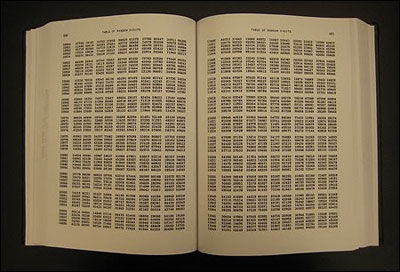A Million Random Digits.

Coilhouse party! It’s happening! In New York! On Sunday, August 21st! Full announcement coming very shortly. For now, allow me to entertain you with a couple of book reviews snippets from Amazon.
RAND Corporation published “A Million Random Digits” in 1955, before it was easy for computers to generate random numbers. It was an important work in the field of statistics and cryptography. Amazon readers of today note:
“Such a terrific reference work! But with so many terrific random digits, it’s a shame they didn’t sort them, to make it easier to find the one you’re looking for.”
“The book is a promising reference concept, but the execution is somewhat sloppy. Whatever algorithm they used was not fully tested. The bulk of each page seems random enough. However at the lower left and lower right of alternate pages, the number is found to increment directly.”
“I took a class in statistics in college. I used this book to help me select random phone numbers for a poll I was conducting for my class project. (The most popular household cleanser in the greater Siouxland area is Bon Ami, by the way.) One of those phone calls was answered by the woman who is now my wife. We’ve been happily married for ten years! Thank you, RAND.”
“If you like this book, I highly recommend that you read it in the original binary. As with most translations, conversion from binary to decimal frequently causes a loss of information and, unfortunately, it’s the most significant digits that are lost in the conversion.”
More reviews here. [via @raindrift]

August 10th, 2011 at 4:21 am
They also made a PRNG (pseudo-random number generator) using lava lamps: http://www.wired.com/wired/archive/11.08/random.html